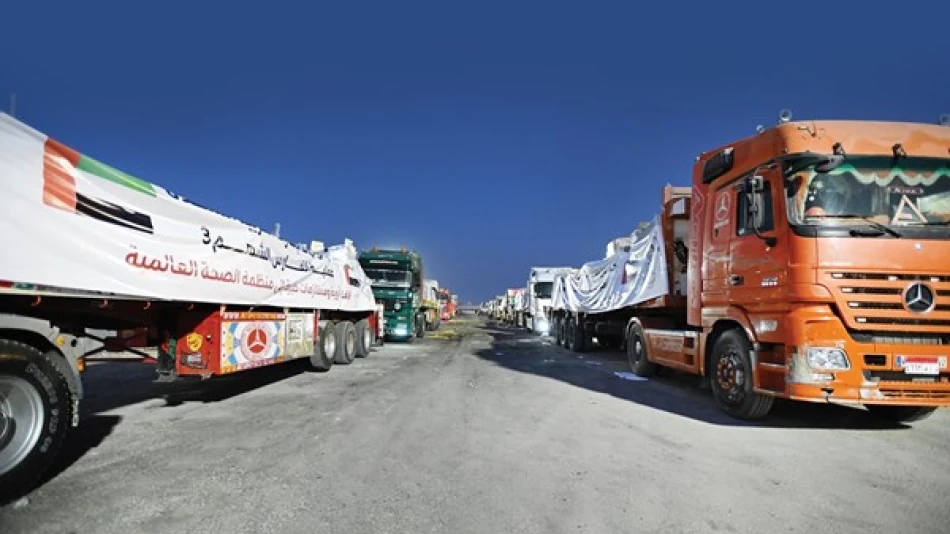
UAE Delivers Vital Food Aid to 22,000 Displaced Gazans, Providing Essential Relief
UAE Humanitarian Aid Becomes Gaza's Economic Lifeline Amid Total Collapse
The United Arab Emirates has distributed over 22,000 food parcels to more than 111,000 displaced Palestinians in southern Gaza camps over just 10 days, as part of its "Noble Knight 3" humanitarian operation. With 748 trucks delivering diverse aid since August and a groundbreaking water pipeline now serving over one million people, the UAE's systematic approach is emerging as a critical economic stabilizer for Gaza's devastated infrastructure and collapsing supply chains.
Massive Scale of Current Relief Operations
Under the direct orders of UAE President Sheikh Mohamed bin Zayed Al Nahyan, "Noble Knight 3" has achieved remarkable logistical efficiency. This week alone, five convoys comprising 100 trucks transported over 2,376 tons of humanitarian supplies through the Rafah crossing. The aid packages include food, medical supplies, flour, and shelter materials, bringing total UAE assistance through the Egyptian border to over 10,000 tons since crossings reopened.
UAE humanitarian teams stationed in Al-Arish oversee precise loading operations and monitor delivery processes, ensuring aid reaches intended beneficiaries across Gaza's displacement camps. This hands-on approach distinguishes the UAE effort from more distant donor operations, providing accountability that both recipients and international observers have noted.
Water Infrastructure: A Strategic Game-Changer
Beyond immediate relief supplies, the UAE has constructed six desalination plants and established a water pipeline from Egyptian territory directly into Gaza. This infrastructure project represents a shift from emergency aid to sustainable resource provision, addressing what experts describe as a "suffocating thirst crisis" affecting Palestinian families.
The water project serves over one million people and includes maintenance of existing wells plus installation of storage tanks and water trucks. For displaced populations facing acute shortages of potable water, this infrastructure functions as what local officials term a "lifeline" for hundreds of thousands of refugees.
Economic Impact Beyond Humanitarian Relief
Gaza Chamber of Commerce and Industry President Engineer Aed Abu Ramadan describes UAE assistance as "lungs through which Gaza's people and local economy can breathe during complete suffocation." The continuous flow of food and medical supplies through air and land bridges has kept local markets functioning at minimum levels, providing essential relief for traders facing unprecedented supply chain collapse.
Abu Ramadan emphasizes that UAE support has measurably reduced humanitarian crisis severity, particularly through delivery of basic food materials like flour and oil that enable families to bake bread—addressing fundamental survival needs for Gaza's population.
Structural Economic Challenges Remain
However, Gaza's crisis extends far beyond food shortages, requiring urgent solutions for alternative energy sources amid severe fuel shortages and collapsed power infrastructure. Local business leaders advocate for reopening basic goods imports as the genuine driver of economic activity and employment, even at minimal levels, since Gaza's markets now lack the most basic daily necessities from food and medicine to cleaning supplies and clothing.
Strategic Humanitarian Model
Palestinian affairs researcher Ali Al-Awar notes that UAE humanitarian operations—including aerial and ground relief, medical projects, and water infrastructure—represent more than announced statistics. These efforts constitute "lives saved and hope renewed for a society facing famine and health system collapse."
The UAE's comprehensive approach encompasses field hospital construction, pharmaceutical shipments, and immediate solutions to water crises, addressing basic needs for hundreds of thousands of Palestinian families through systematic, infrastructure-focused humanitarian intervention.
Implications for Regional Humanitarian Strategy
The UAE's model combines immediate relief with infrastructure development, setting a precedent for humanitarian operations in conflict zones. Unlike traditional aid that addresses symptoms, the water pipeline and desalination plants suggest long-term strategic thinking about Palestinian survival and regional stability.
This approach positions the UAE as a key humanitarian actor in Gaza, with operations that serve both immediate crisis response and longer-term geopolitical influence in Palestinian territories. The systematic nature of aid distribution and infrastructure development indicates sustained commitment beyond typical emergency response timelines.
Most Viewed News

 Layla Al Mansoori
Layla Al Mansoori






